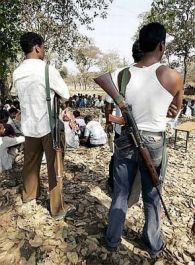 | « Back to article | Print this article |
Statistics show the failure of the Bihar government in acting against Naxals in the state who are able to set up bases without much difficulty. Vicky Nanjappa reports
 The Bihar government has been accused of going soft on the Indian Mujahideen and latest statistics reveal that their handling of the Naxal issue in the region has been very poor as well.
The Bihar government has been accused of going soft on the Indian Mujahideen and latest statistics reveal that their handling of the Naxal issue in the region has been very poor as well.
Naxal attacks have increased in the past year while the IM have been easily been able to set up base in the state.
The Darabhanga module of the IM happens to be the biggest and most dangerous module that carried out the Mumbai 13/7 blasts, the Dilsukhnagar, Bodh Gaya and Patna attacks.
Chief Minister Nitish Kumar has been accused of not acknowledging the problem. Even the Home Ministry states that he has handled the issue poorly.
In 2012, 33 civilians were killed by Naxals but in 2013 it has risen to 60.
The number of Naxals arrested in 2012 was 409 but in 2013 it is 260.
The year 2012 saw the death of 5 Naxals but in 2013 it is nil. The number of security personnel killed in 2012 was 3 but in 2013 it is 19.
The statistics show a failure on part of the state which has got at least 130 warnings from the Intelligence Bureau in the past two years. The IB points out that Naxals today prefer Bihar as their cadres are being hunted down in Jharkhand and Chhattisgarh. They are making inroads into eastern Bihar where they and setting up bases. Security forces have been caught off guard several times and there has been a lacklustre approach to the problem, says IB.
After the Pune and Karnataka-Delhi modules of the Indian Mujahideen were busted, the strength of the IM had reduced to 10. A team led by Yasin Bhatkal, Tehsin Akthar and Assadullah Akthar took shelter in Darabhanga. They contacted Fasih Mahmood, a resident of Darabhanga settled in the Gulf for funds.
Traces of an IM revival from Bihar were witnessed right in 2010. Repeated alerts from the Centre were ignored. Despite the arrest of Yasin and Assadullah the group was strong enough to carry out the Patna blast. From 10 members in 2010, today it has nearly 60, not to forget a well connected module in the Gulf.
Police officers of several states complain that it is not possible to enter Darabhanga to arrest anyone. The system in Bihar is against us and it showed in the refusal to question Yasin Bhatkal after his arrest.
The Darabhanga module has led to the creation of a sub module in Jharkhand -- the Patna blasts is proof.